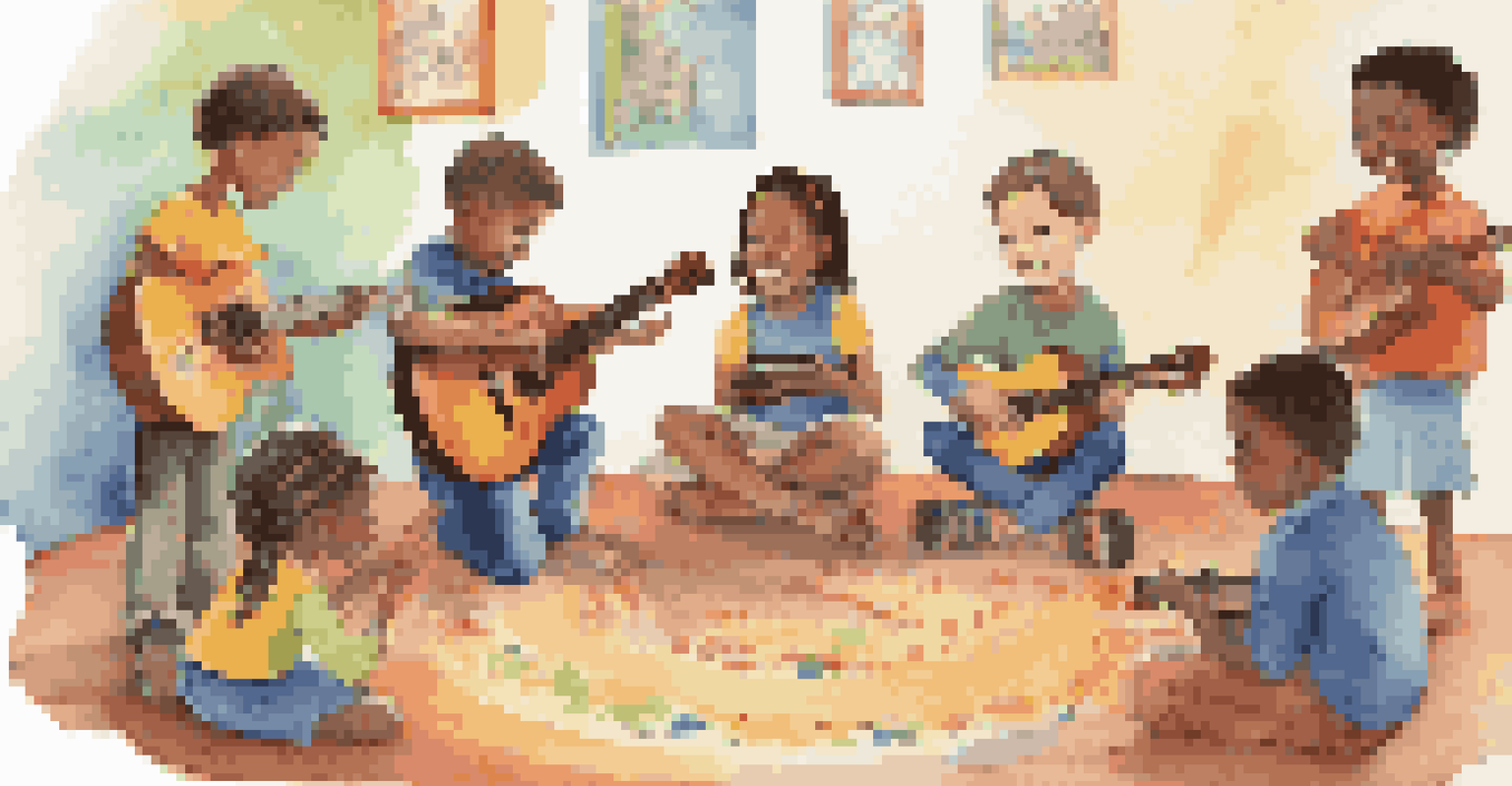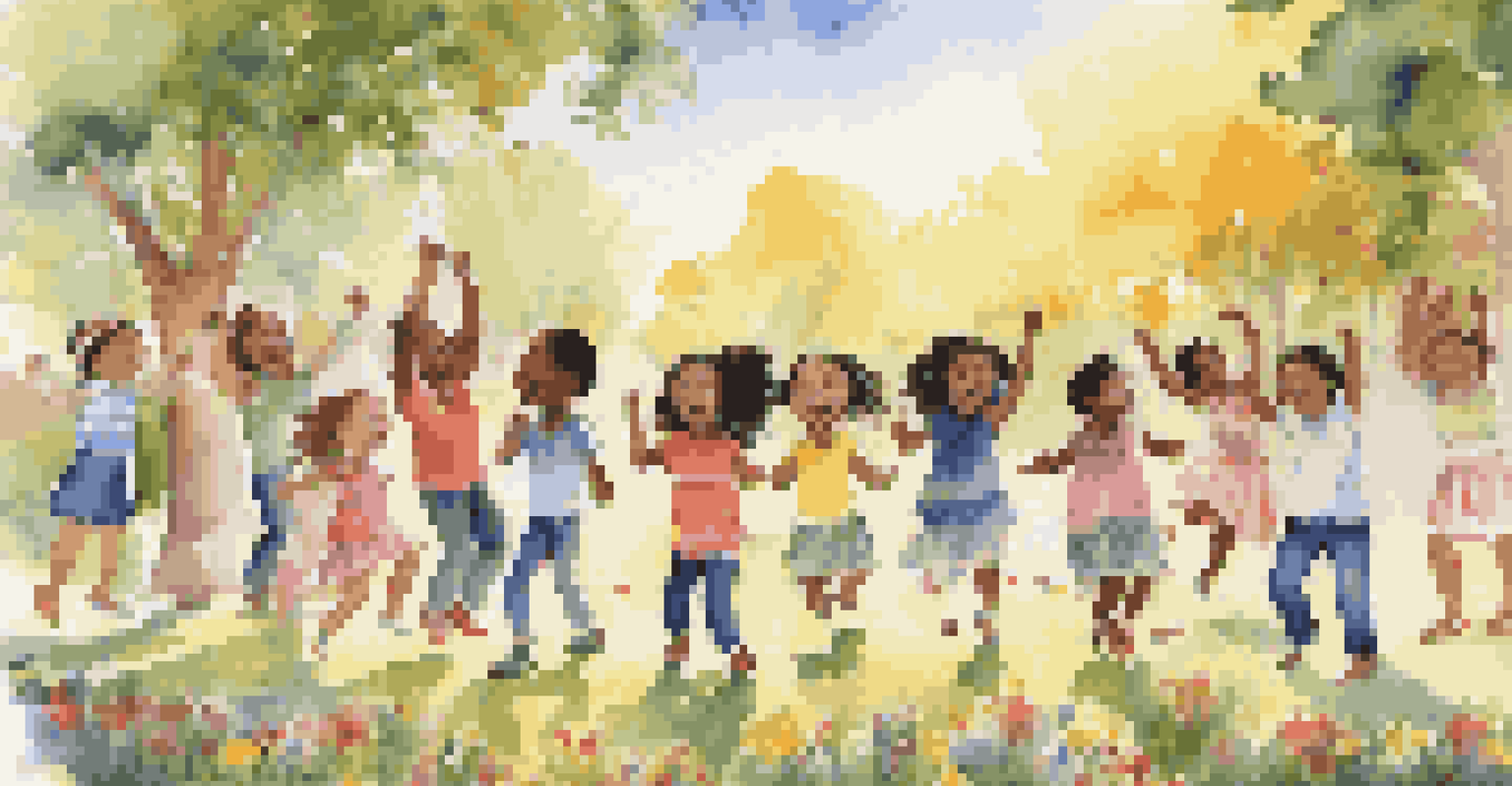Understanding the Role of Music in Child Behavioral Issues

The Connection Between Music and Child Behavior
Music has a unique way of influencing our emotions and behaviors, and children are no exception. When kids listen to music, it can affect their mood, energy levels, and even how they interact with others. This connection makes music a powerful tool for addressing behavioral issues.
Music can change the world because it can change people.
For instance, a child who is feeling anxious might benefit from calming music, which can help them relax and reduce their stress. Similarly, upbeat songs can energize a child who is feeling sluggish or apathetic, encouraging them to engage more actively with their surroundings.
Research shows that music can trigger emotional responses and even alter brain chemistry, making it a fascinating area of exploration for parents and educators alike. Understanding this connection opens up new avenues for addressing behavioral challenges in children.
How Music Therapy Supports Behavioral Change
Music therapy is a structured approach that uses music to achieve specific therapeutic goals. In this setting, a trained therapist works with children to explore their feelings and behaviors through musical interaction. This can include singing, playing instruments, or even composing songs together.

An example of this would be a child expressing frustration through drumming, allowing them to release pent-up emotions in a constructive manner. Over time, this process can help children develop better coping strategies for managing their behavior and emotions.
Music's Impact on Child Behavior
Music can significantly influence children's emotions and behaviors, serving as a powerful tool for addressing various behavioral issues.
Moreover, music therapy can foster a sense of belonging and connection, as children often bond over shared musical experiences. This social aspect is particularly crucial for kids who may struggle with social interactions due to behavioral issues.
Music as a Tool for Emotional Expression
Children often find it challenging to articulate their feelings verbally, which can lead to behavioral outbursts. Music provides an alternative outlet for emotional expression, allowing kids to convey what they might struggle to say. Through music, children can explore different emotions in a safe and supportive environment.
Where words fail, music speaks.
For example, a child might write lyrics about feeling sad or angry, transforming those emotions into something tangible. This creative process not only helps them understand their feelings but also encourages emotional literacy and resilience.
Additionally, listening to songs that reflect their emotions can help children feel understood and validated. This sense of recognition can be incredibly powerful in helping them navigate their feelings and behaviors.
The Role of Music in Social Skills Development
Engaging with music can also foster social skills in children, particularly those facing behavioral challenges. Group music activities, like choir or band, encourage teamwork and collaboration, teaching kids how to work together towards a common goal. These interactions can be especially beneficial for children who struggle with social cues.
In a group setting, children learn to listen to one another, take turns, and communicate effectively—skills that are vital for positive social interactions. For instance, playing in an ensemble requires children to coordinate with their peers, enhancing their ability to collaborate and engage socially.
Music Therapy Enhances Wellbeing
Music therapy provides structured support for children to express their emotions and develop coping strategies through musical interaction.
Furthermore, celebrating achievements, such as a successful performance, can boost self-esteem and reinforce positive behaviors. When children feel valued and included, they are more likely to engage positively with others.
Using Music to Encourage Positive Behavior
Integrating music into daily routines can serve as a positive reinforcement strategy for encouraging desired behaviors. For example, using songs as cues for transitions—like cleaning up or getting ready for bed—can make these tasks feel more enjoyable for children. This playful approach can reduce resistance and promote cooperation.
Moreover, parents and educators can create playlists that align with specific goals, such as calming music for quiet time or energetic songs for playtime. This not only helps set the mood but also establishes expectations, guiding children's behaviors in an engaging manner.
By consistently using music in this way, children can learn to associate positive behaviors with enjoyable experiences, reinforcing their motivation to behave appropriately.
Cultural Influences of Music on Child Behavior
Cultural background plays a significant role in how children respond to music, affecting their emotional and behavioral development. Different cultures have distinct musical traditions that can shape children's understanding of rhythm, melody, and expression. This cultural influence can also impact how kids relate to others and navigate social situations.
For instance, children raised in musical families may have a greater appreciation for collaboration and creativity, fostering skills that support positive behavior. Likewise, exposure to diverse musical styles can promote empathy and understanding of different perspectives.
Cultural Context Shapes Musical Response
Children's cultural backgrounds influence their relationship with music, affecting their emotional development and social interactions.
Ultimately, recognizing and embracing these cultural influences allows for a more holistic approach to addressing behavioral issues, as it incorporates the rich tapestry of experiences that shape a child's identity.
Conclusion: Music as a Lifelong Tool for Growth
In summary, music is much more than just a form of entertainment; it serves as a powerful tool for addressing child behavioral issues. From enhancing emotional expression to fostering social skills, the benefits of music are vast and varied. By integrating music into daily practices, parents and educators can create supportive environments that nurture a child's growth.
As children engage with music, they learn valuable life skills that extend beyond the realm of behavior. They develop resilience, emotional intelligence, and the ability to connect with others—skills that will serve them well throughout their lives.

Embracing the role of music in child development not only addresses immediate challenges but also lays the foundation for a brighter, more harmonious future.